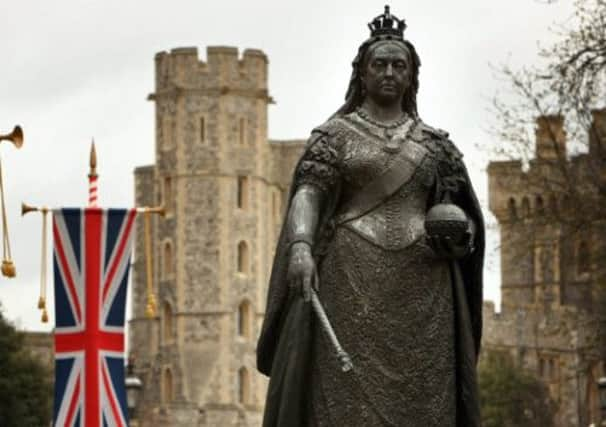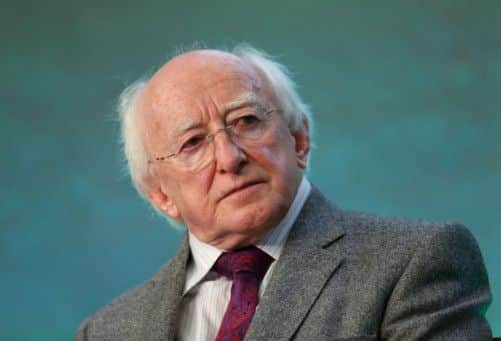Michael Fry: Anglo-Irish and Anglo-Scots relations


TO THE already crowded calendar of events bearing on the future of these islands in 2014 we can now add the first overnight stay at Windsor Castle, as a guest of the Queen, by a president of Ireland, Michael D Higgins, and his wife Sabina.
This, as part of a state visit due to last three days in April, is in return for the Queen’s successful trip to Dublin a couple of years ago, when she paid her respects to the Republican dead and in one speech delivered a line in Irish. What would her grandfather King George V, who in effect lost Ireland from the British Empire, have said to that? But then, what would Éamon de Valera have said to the Irish president hobnobbing with the House of Windsor, indeed sleeping under their roof at Windsor?
Advertisement
Hide AdAdvertisement
Hide AdA lot of things have changed in what are usually called Anglo-Irish relations. This further step will be a test of the changes, a test in particular of the mood they have helped to generate in England, which cannot otherwise look forward to all that happy a year in 2014. There will be both internal and external challenges to the UK, in the Scottish referendum and in relations with the EU. So far, the main English reaction to such challenges has been a flight into xenophobia, with the rise of UKIP and growing intolerance of immigrants by both Tories and Labour.


There is growing intolerance of Scottish aspirations as well, and it will be interesting to see how this squares with the appearance on the scene of a man who represents the successful fulfilment of Irish aspirations. He will no doubt do it in his own inimitable manner. A poet as well as a politician (not, of course, a rare combination in Ireland), the most striking thing about him is his stature, 5ft 4in – quite a contrast to his willowy wife.
It is not hard to think of certain columnists in certain English newspapers who might satirise this: the word leprechaun will leap to mind. These scribblers will not necessarily be restrained by the thought that a visiting head of state cannot answer back, though if he did they would soon find he had a tongue as sharp as their quills.
If common courtesy is no longer a restraint, a stronger inhibition may arise from the fact that Anglo-Irish relations are today warmer than at any time since Strongbow’s invasion of the Emerald Isle in 1170, and who would want to cloud them? It is not so long ago, after all, that Ireland’s pursuit of its own sovereign interests was still regarded with mirth or irritation in London.
I remember the hilarity at HM Treasury when, in 1979, the Irish pound broke its link with sterling to join the European Exchange Rate Mechanism (forerunner of the euro) and promptly sank in value. What folly of the Paddies, they chortled in Whitehall, to repudiate their historic reserve currency. Now hardly anybody but the few remaining British colonies uses sterling as a reserve currency, so lousy has its own performance been. When the very idea of a future Scotland using it is spurned, we see how poor the economic judgment of the British establishment remains.
We should also remind ourselves during the presidential visit in April that peace could not have come to Ulster without the active support and participation of the Irish government. It would be less diplomatic to recall how these good offices only gradually came into play in the teeth of resistance from the British government. When sectarian violence turned murderous in the time of Edward Heath and William Whitelaw, they rejected out of hand the offers of mediation from Dublin: this was an internal affair of the UK, concerning nobody else.
Happily, it did eventually dawn on Whitehall that the long crisis in Northern Ireland could only be solved by the efforts of all sides. The solution, the Good Friday Agreement of 1998, was the joint achievement of London and Dublin as well as of the contending factions in the province. We could put it another way and say it was only after the British government consented to treat the other parties in the dispute as equals that the breakthrough could follow. But let us not be churlish, and instead rejoice that the agreement still holds despite challenges to it, to form the backdrop to the present era of peace in Ulster and goodwill across the Irish Sea. President Higgins’s visit to Windsor sets the seal on a connection that is now a most cordial one.
So much for Anglo-Irish relations, but consider how sour and disobliging Anglo-Scottish relations have become. The dirty tricks of the politicians are bad enough, yet they are as nothing to the streams of venom and bile that issue from the bowels of the English population and spill out in blogs and phone-ins or in the letters and columns of some popular newspapers. In these quarters, the decision by the Scottish Parliament to give the people the choice of independence in 2014, endorsed by the Edinburgh Agreement between Alex Salmond and David Cameron, is seen as a piece of impudence to be treated with scorn and contumely. Just as Anglo-Irish relations have never been better, so Anglo-Scottish relations have never been worse, at least not since 1707.
Advertisement
Hide AdAdvertisement
Hide AdThings may improve, perhaps despite rather than because of the referendum, but the basic change needs to be qualitative rather than quantitative. Relations between Scotland and England are like those between Ireland and England used to be. We should wish the relations between Scotland and England to become like those between Ireland and England are now. It would be as well to remember that, in the latter case, they are relations between two equal, independent nations.